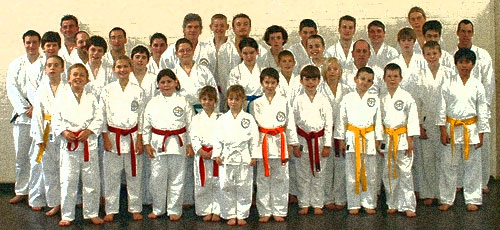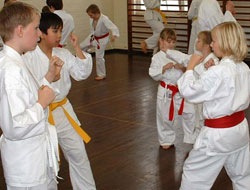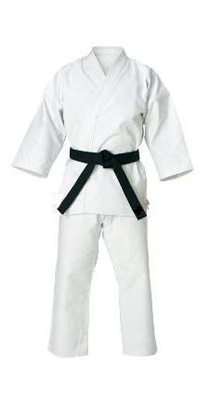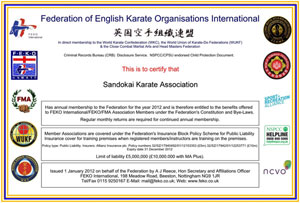F.A.Q.s
Frequently Asked Questions.
We get asked the same questions about Karate all the time. We don't mind. We are passionate about our art and enjoy talking about Karate to anyone who will listen!
To save a bit of time, some of the more common questions we get asked are below.
Click on one of the topics below to reveal the answer to your question.
-
What is Karate?
 Karate as a Martial Art combines smooth, flowing, evasive movements with sudden kicks and strikes.
Karate as a Martial Art combines smooth, flowing, evasive movements with sudden kicks and strikes.
The emphasis is on power (both physical and mental) and the development of skill sets so you don't have to be big and strong to protect yourself or your family.
Karate covers a broad spectrum of self defence, and as such has an obvious attraction for men, women and children of all ages.
Karate is also a good way to improve overall fitness, suppleness and general well-being. -
Why practice Karate?Most people take up Karate for self defence. Even people who think they can defend themselves usually cannot! The majority of law abiding citizens would not be able to deal with a potentially violent situation, so what chance do they have against the mugger, rapist or hooligan?
Some of the benefits that can be derived from regular practice of Karate by people of all ages, regardless of sex are...- The promotion of physical fitness.
- Deeper mental awareness and self control.
- A practical method of self defence.
- Respect, and an understanding of yourself and others.
- A strong social aspect where many friendships are made.

-
Is Karate suitable for children?
 Karate is one of the best recreational pursuits that a child can practice. With the high degree of discipline in the class, the child will learn to accept responsibilities, become more aware and self confident without being big headed. Add this to the fitness and self defence benefits and you can see why so many parents enrol their children into Karate classes. We usually accept children from about eight years of age as this the age that they can appreciate that Karate is not a "game". The last thing we want is a teacher complaining that little Jimmy "accidentally" broke someone's jaw in the playground!
Karate is one of the best recreational pursuits that a child can practice. With the high degree of discipline in the class, the child will learn to accept responsibilities, become more aware and self confident without being big headed. Add this to the fitness and self defence benefits and you can see why so many parents enrol their children into Karate classes. We usually accept children from about eight years of age as this the age that they can appreciate that Karate is not a "game". The last thing we want is a teacher complaining that little Jimmy "accidentally" broke someone's jaw in the playground!
Karate is also a pursuit for the more mature person. Many people have taken up Karate in their 40's and above, and still gain from the practice. Our oldest student took up Karate at the age of 61 as a means of keeping mentally and physically active in retirement.
Read More About Children In Karate -
Is Karate suitable for women?
 Without exception - YES!
Without exception - YES!
Most women today are aware of the need to look after themselves. Karate helps make you more aware of yourself.
Karate is high on aerobic fitness so you can achieve good body tone as well as learning to defend yourself. Karate has many benefits, as more and more women are learning.
Read More about Women in Karate -
How long to be any good?
 It is difficult to put a time factor on how long it takes to become any good at Karate as everyone has a different potential to learn. We have had students successfully defend themselves in a "real" fight after only a few weeks of training, others take longer. There is no "quick fix" in karate, and you get back what you put in.
It is difficult to put a time factor on how long it takes to become any good at Karate as everyone has a different potential to learn. We have had students successfully defend themselves in a "real" fight after only a few weeks of training, others take longer. There is no "quick fix" in karate, and you get back what you put in.
We have found from past experience that after six months or so training most students are well on the way to achieving a good, sound knowledge of karate and self defence. On average, it will take about three years to attain a black belt. -
How much time per week?
 How long is a piece of string?
How long is a piece of string?
Many students train twice a week, and the training schedules for taking belts are based on this. Some people cannot make two sessions due to work commitments or other factors, and this is perfectly acceptable. Obviously, though, the more you train the faster you will progress.
We have found that initially people train once a week. Towards the end of their first year of classes many people realise that to progress at a reasonable rate they need to train twice a week, and it is not uncommon for higher grades to train three times a week.
Though it is possible to train nearly every night, it isn't recommended. Three sessions a week is more than enough for even the most fanatical karate student!
And there are always elements of Karate that you can practice at home at your leisure... -
What about injuries?
 Karate does involve physical contact, and you have to be very lucky or extremely good to avoid the occasional bruise in your Martial Arts career. The instructors are very aware of the potential for injury and constantly strive to promote technical excellence and self control to reduce the risks. Because of this Karate has one of the lowest injury rates of all "sports", much less than Rugby or Football.
Karate does involve physical contact, and you have to be very lucky or extremely good to avoid the occasional bruise in your Martial Arts career. The instructors are very aware of the potential for injury and constantly strive to promote technical excellence and self control to reduce the risks. Because of this Karate has one of the lowest injury rates of all "sports", much less than Rugby or Football.
If you do get a knock during your karate classes it is comforting to know that all of the Sandokai instructors are qualified First Aiders.
It is the policy of Sandokai Karate that every Black Belt (and most of the brown/blue belts) hold current First Aid certificates. -
How fit do I need to be?
 The majority of new students of all ages and sexes are unfit. Your instructor understands this and it is his or her job to ease you into the training.
The majority of new students of all ages and sexes are unfit. Your instructor understands this and it is his or her job to ease you into the training.
If you have any doubts ask your Doctor to give you an opinion as to whether you are capable of undertaking Karate training.
Many people of varying (dis)abilities have also benefited from Karate training, though this does depend on the nature of your disability.
If you want further information on disability issues contact us. -
When can I start?
 The longest journey starts with but a single step.
The longest journey starts with but a single step.
Take that step now and come in to your local club.
The first training session is free, and then we charge £4 for a lesson (usually 2 hours) on a per session basis. We don't charge joining fees or require payments by direct debits.
Beginners are welcome at any time, as are people with previous Martial Arts experience. -
What to wear?Initially, anything loose and comfortable; a track suit and a white T-shirt is ideal. Bear in mind that we train in bare feet.
If you have any jewellery (rings, watches, necklaces etc.) please remove them before training, or, better still, leave them at home.
When you want a proper Karate Gi (suit) talk to your instructor. We can often get suits at a lower cost than in your local Sports' Shop. A complete basic gi costs from about £15.00 to £25.00 (depending on height), though you can pay over £100.00 for a custom "brand name" Japanese gi.
-
What else should I know?Sandokai is an autonomous members of the Federation of English Karate Organisations, so all our grading examinations are held locally with senior grades of 4th Dan and over ratified by the Governing Body. Sandokai has some of the highest graded black belts in Cornwall and our instructors are trained to a high level, insured and have First Aid Certificates.
All of our instructors are checked and certified by the Criminal Records Bureau in light of current child abuse issues.
Apart from our normal "club training" we have regular grading examinations, special courses, social events and attend local and national competitions.
Whatever your needs, there is something for you in Karate. For many people Karate is more than a hobby, it is a way of life.
Open all Close all
If there is anything that you would like to know which isn't covered in the sections above please contact us.

